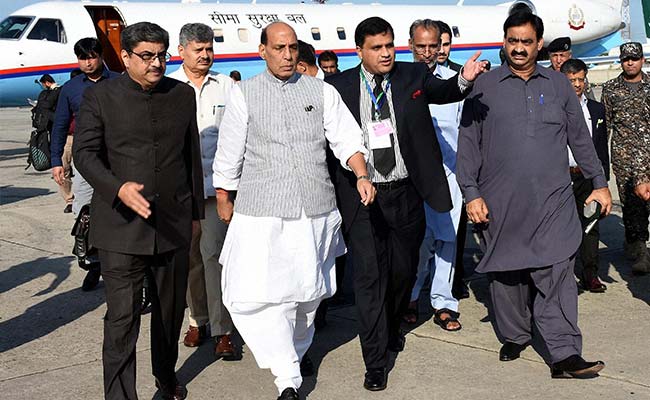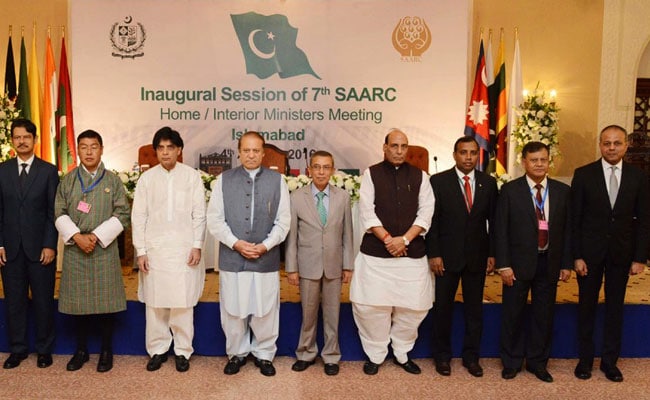But let's remember this: India's Home Minister wasn't there to talk to Pakistan. He was there to talk to all of SAARC - a grouping that has for too long been held hostage to the constant friction between its two largest constituents. We need to grow up, and stop looking at India's foreign policy through the single lens of the India-Pakistan relationship. The growth of SAARC institutions is vitally important for India too.
The problem is that the emotional overtones attached to the India-Pakistan relationship tend to overshadow any rational discussion of India's neighbourhood policy. And the current government has done little to break out of this trap. It began by treating Prime Minister Narendra Modi's swearing-in as some sort of imperial durbar, with all the neighbourhood satraps in attendance; it then moved on to breaking a decade-long ceasefire on the Line of Control to pretend to its macho, assertive base that it was tough on Pakistan; it broke off secretary-level talks in inexplicable dudgeon just because Pakistan talked to the Hurriyat; then, chastened by lack of results, it began talking again. And let's not forget Modi's dramatic and pointless Christmas visit to Sharif's house. The Modi government has operated throughout on emotion, and not with a clear goal in mind.
Seen one way, this is odd; seen another way, this is unsurprising.

Home Minister Rajnath Singh arriving in Islamabad to attend the SAARC summit meeting
This divergence, between how you talk about Pakistan in general and how you actually deal with Pakistan yourself needs an explanation. But when it is seen from the standpoint of the Bharatiya Janata Party's pathologies about Pakistan, it becomes a little clearer. Indeed, when you consider the expectations of Narendra Modi's base, it becomes downright unsurprising.
A crucial part of Modi's appeal to his strongest supporters was that he would terrify China and Pakistan. This is not a rational expectation; it demands emotional fulfilment. Modi's government may seek to take a rational approach to Pakistan when its base is occupied by some other controversy or issue. But when the base is paying attention, then Modi's government has neither the intellectual strength, nor the moral fortitude, nor the political imagination to counter its base's expectations.

Pak Prime Minister Nawaz Sharif and Home Minister Rajnath Singh with delegates after the inauguration of the SAARC Home Ministers' conference (AFP photo)
The atmosphere around Singh's trip to Pakistan, and what he said at the SAARC meeting, are another manifestation of this strange inversion. India has a wonderful opportunity to insulate how it deals with Kashmir with how it deals with Pakistan - which has been its strategic ambition all along. But the government's craven fear of alienating its base, and its unwillingness to tell its base that the Kashmir protests are, this time at least, entirely our problem and not fomented from overseas, means that it is reduced to macho posturing even at a SAARC event.
Sure, Pakistan PM Nawaz Sharif called Wani a martyr. Big deal. Words are cheap. After Wani's death, did Pakistan up the transfers of cash or AK-47s across the border to stoke the protests and inflame violence? If so, show us. If not, then I say again: words are cheap, and India would have done well to ignore them. Sharif will say what he must say to cover his doing what he wants to do.
The fact that Sharif called Wani a martyr - or that the murderous madman Hafiz Saeed was allowed to hold a rally as Singh arrived - should have neither dominated our coverage, nor been the takeaway from Singh's speech. Protests will happen and Pakistani premiers, as long as they want to get elected, will have to pay lip service to Kashmiri Islamists. India has other fish to fry. What a pity that the government is too scared of its own supporters to fry it.
(Mihir Swarup Sharma is a fellow at the Observer Research Foundation.)
Disclaimer: The opinions expressed within this article are the personal opinions of the author. The facts and opinions appearing in the article do not reflect the views of NDTV and NDTV does not assume any responsibility or liability for the same.


